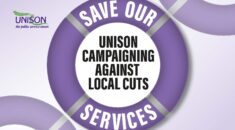[This article was updated on 5 March to include details of Northamptonshire’s budget decision]
UNISON members working for Northamptonshire council face having their pay frozen from 1 April after the county council passed a last-minute budget with £40m worth of cuts.
The budget was passed by the Conservative council on 28 February – the day before the deadline for setting a council tax rate – after auditors KPMG warned that the earlier version with £29m of cuts was unlawful because it did not balance.
The new budget added further cuts including:
- the pay freeze, in place of a proposed 2% pay rise;
- closing 21 libraries;
- ending all bus subsidies from the end of the school year in July;
- a 42% cut in the budget of the trading standards service, responsible for protecting public health and public safety;
- reducing the highways budget, affecting inspections and repairs to both roads and footpaths in the county;
- more “on-street parking controls” across Northamptonshire;
- reducing councillors’ allowances.
In addition, councillors agreed that spending controls in place under the Section 114 notice will continue into the new financial year.
The notice, which the council issued in early February, called a halt to any new spending until the end of the 2017-18 budget year, on 31 March. At the same time, the council faced a £21.1m gap between its income and spending for this year.
Northamptonshire’s move was the first time such a notice – under Section 114 of the 1988 Local Government Finance Act – had been issued in any local authority in 20 years.
And in November last year, the council ordered all staff to take a day’s unpaid leave – essentially a pay cut – as it tried to save money.
In January this year, the government appointed an inquiry to look into its financial management and governance, under former Hackney and Barnet chief executive Max Caller.
This reported on 15 March and said the council’s problems were were so deep-rooted that it could not be rescued.
As an immediate step, it called on the government to send in commissioners to take over the day-to-day running of the council. In the longer term, Mr Caller said the county council should be scrapped and replaced with two new unitary authorities.
The inquiry said one should Daventry, Northampton and South Northamptonshire and the other Corby, East Northamptonshire, Kettering and Wellingborough, and both should be in place in 2020.
Council leader Heather Smith resigned after the Caller report was published.
[Caller report details updated on 16 March]
But UNISON national officer Matthew Egan warns that Northamptonshire is just the first outward sign of a growing crisis in local government finance.
There are a number of factors involved in Northants, he says: central government cuts, historically low council tax rates and a vigorous outsourcing policy.
Those combined, with increasing demand for services – particularly in both adult and children’s social care – to create a perfect storm.
Director of social care Anna Earnshawe warned Northants council’s cabinet budget meeting that severe underfunding means adult social services are on the “edge of being unsafe”, with 2,000 cases unassigned.
“The fact that Northamptonshire council has had to issue a section 114 notice will hopefully at least make more people aware of the battering that local councils have endured thanks to the reckless actions of Westminster governments since 2010.”
UNISON national officer Matthew Egan
But the biggest factor in the crisis, says Mr Egan, is the cuts in central government funding.
London, Edinburgh and Cardiff have finalised their local government finance settlements, but as UNISON warned, even with a “tiny increase” in funding, the figures “are nowhere near enough to meet the pressures that local government is collectively facing”.
In England, for instance, the government gave an extra £150m for councils, via the adult social care grant. But that service faces a £2.3bn funding gap by 2020.
Central government is increasingly working to make local government rely on council tax and business rates, with a substantially reduced level of central grants.
Both UNISON and the Local Government Association are urging the government to release billions of pounds it has accumulated from its share of business rates.
The crisis in local government finances has been building for some time, says Mr Egan. “And because many council services are hidden from view or might only be used by a relatively small number of people in the local community, many people are unaware of the devastating impact that cuts to council budgets have had.
“The fact that Northamptonshire council has had to issue a section 114 notice will hopefully at least make more people aware of the battering that local councils have endured thanks to the reckless actions of Westminster governments since 2010.”
Now the crisis is coming to a head.
The ruling Conservative group in Northants passed a motion of no confidence in its own council leader days before finally setting its budget on 28 February.
And Conservative councillor Robin Brown, who was responsible for drawing up the budget, told the meeting: “Northamptonshire is at the leading edge of a financial challenge the severity of which local government has never seen before.
“It is a challenge all top-tier authorities will face, but Northamptonshire has reached crisis point now.”
And whatever other individual factors are at play in Northamptonshire, whatever the result of the Caller inquiry, Mr Egan agrees that the council won’t be the last to find itself in dire straits, unless the government changes its approach to local government.
UNISON policy: Local government finance (motion passed at 2015 service group conference)






